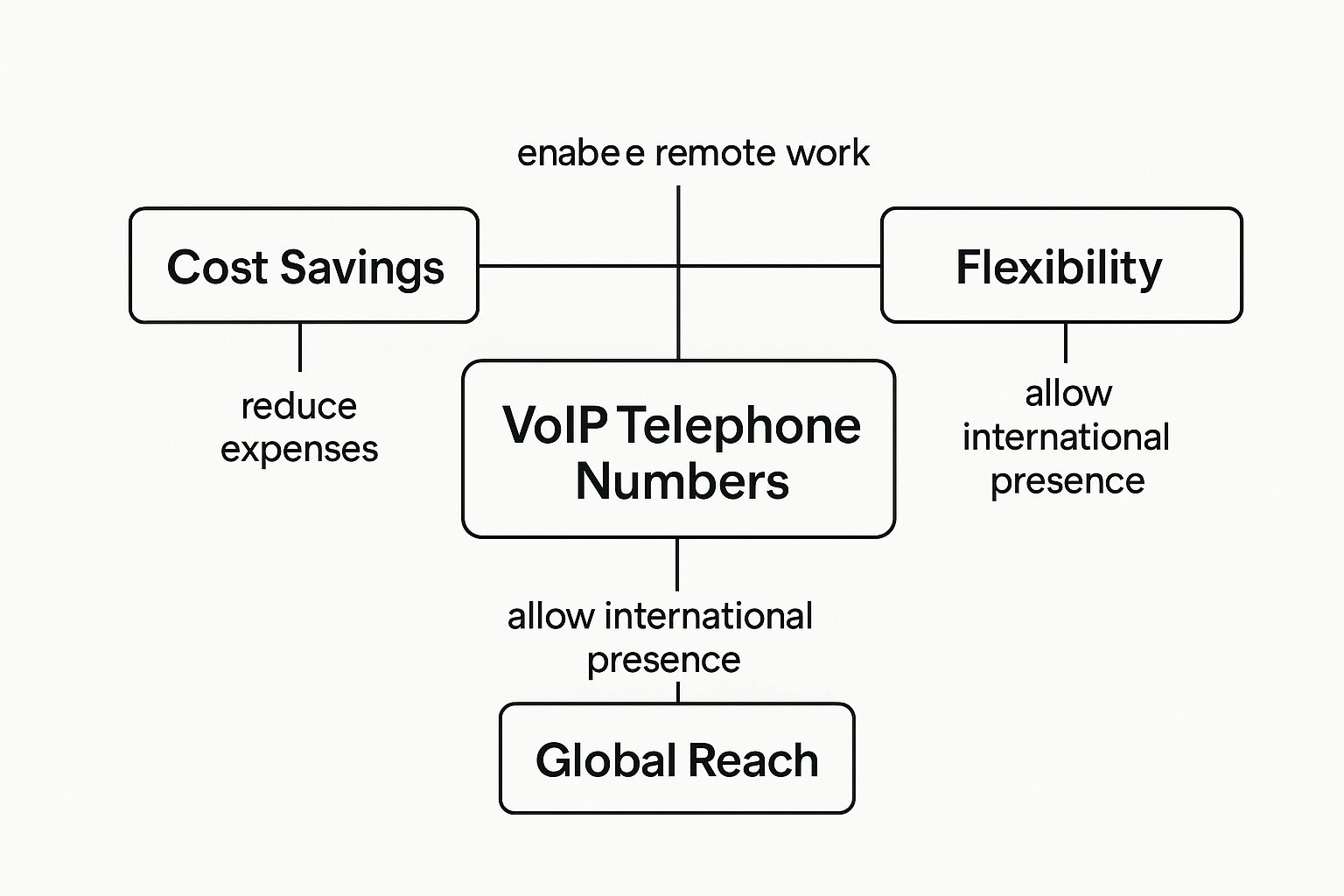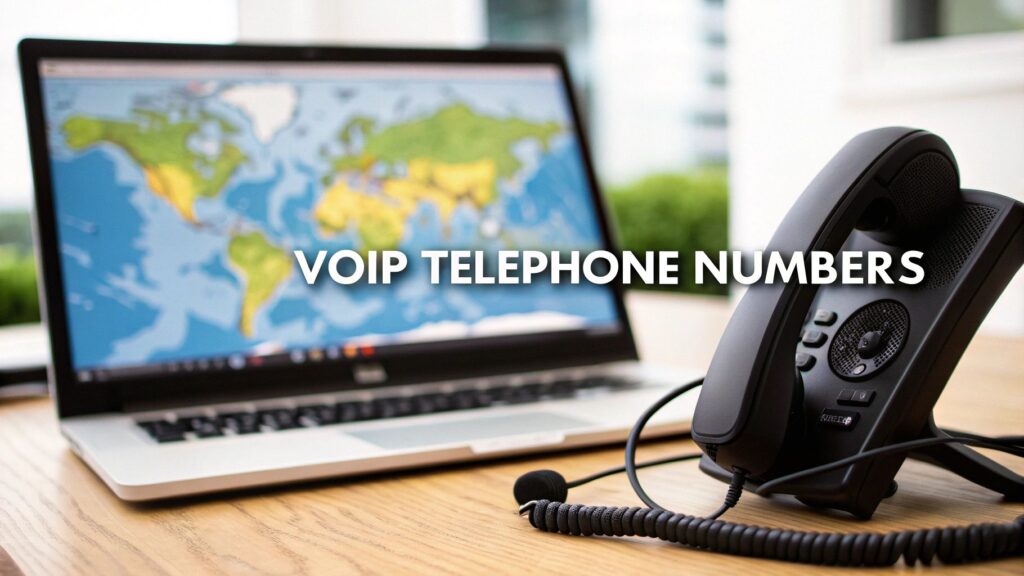At its heart, a VoIP telephone number is simply a phone number that works over the internet rather than a traditional copper phone line. Think of it like your professional email address: it belongs to you and can be accessed anywhere, but it isn't physically anchored to a single desk phone or office. This one difference gives your business incredible freedom.
So, What Exactly Are VoIP Telephone Numbers?
Let's get straight to it. VoIP stands for Voice over Internet Protocol. In simple terms, this technology converts your voice into digital packets of data and zips them across your internet connection, much like an email or a video you're streaming. This small but powerful shift completely reinvents what a phone number can do for your business.
Instead of being chained to a physical line that a phone company installs in your wall, a VoIP number is virtual—it lives in the cloud. This is where its real power lies. It means you can make and answer calls from a whole range of devices, including:
- Dedicated IP Desk Phones: These look just like the office phones we all know, but they plug into your internet router instead of a phone socket.
- Computer Softphones: This is an application on your laptop or desktop. Pop on a headset, and your computer becomes your business phone.
- Mobile Apps: This turns your personal smartphone into your business line, letting you keep work and personal calls completely separate while using just one device.
This approach unties your business communications from any single location. An employee can answer your main office number from their home in Manchester, a co-working space in London, or even while travelling abroad. For your customer, the experience is completely seamless; they just dial your normal business number as they always have.
The Core Difference From Traditional Lines
The real distinction comes down to the delivery method. A traditional landline relies on a physical copper wire running to your building, managed by a major telecoms company. If you move offices, you're stuck with the time-consuming and often expensive hassle of getting that line transferred.
A VoIP number, on the other hand, is assigned to you, the user, not to a physical location. This freedom is a game-changer. It means you can move, expand, or switch to hybrid working without ever giving your phone system a second thought. It’s a modern solution designed for how businesses operate today.
This image neatly lays out how VoIP technology connects directly to major business benefits.

As you can see, the core technology is what unlocks key advantages like greater flexibility, significant cost savings, and the ability to establish a professional presence anywhere.
To make the differences even clearer, here’s a straightforward comparison between the two systems.
VoIP Numbers vs Traditional Landlines at a Glance
| Feature | VoIP Telephone Number | Traditional Landline |
|---|---|---|
| Technology | Uses your existing internet connection to send and receive calls as digital data. | Relies on a physical copper wire network (the PSTN) installed at your specific location. |
| Flexibility | Hugely flexible. Calls can be answered on desk phones, computers, or mobile apps from anywhere with internet access. | Completely inflexible. Calls can only be answered on the specific phone handset connected to that physical line. |
| Scalability | You can add or remove phone lines and users almost instantly through a simple online dashboard. No engineer visits are needed. | Adding new lines is a slow and costly process that almost always requires a technician to install new wiring. |
| Cost | Significantly lower monthly costs, often with inclusive minutes and no expensive line rental charges to worry about. | Higher overall costs due to mandatory line rental, steep per-minute call charges, and maintenance fees. |
The table really drives home the point: VoIP is built for agility and efficiency, while landlines are a legacy of a more static way of working.
The Real-World Business Advantages of Switching to VoIP
Moving to a VoIP telephone number is far more than just a technical upgrade; it's a strategic decision that brings tangible benefits to your bottom line. What would it mean to slash your monthly phone bill, give your team the power to work from anywhere, and present a polished, professional image that builds instant customer trust? These aren't just small improvements—they're fundamental enhancements to how you do business.

This technology unlocks serious cost savings, greater operational freedom, and a much stronger brand presence. For any business trying to stay competitive, these are crucial advantages. Let’s look at the real results that companies across the UK are seeing every day.
Slash Your Communication Costs
One of the first things you'll notice is the dramatic drop in your phone bill. Old-school phone systems are notorious for their high line rental fees, eye-watering call charges (especially for international calls), and often expensive maintenance contracts.
VoIP pretty much does away with all of that. Since it runs over the internet connection you're already paying for, the need for a separate, physical phone line vanishes. It's not uncommon for businesses to see their phone-related costs drop by up to 75% after making the switch.
By routing calls over the internet, VoIP bypasses the steep per-minute rates that traditional phone companies charge. This makes it an incredibly cost-effective choice, particularly for small businesses looking to keep a tight rein on their overheads.
Think about the recurring savings you’ll make from:
- No more line rental: A significant monthly expense that simply disappears from your budget.
- Cheaper calls: Most VoIP plans include a bundle of UK minutes and offer much lower rates for international calls.
- Minimal hardware investment: You can use devices you already own, like computers and smartphones, avoiding the need to buy pricey new handsets for everyone.
That extra cash can be put to much better use, fuelling other critical parts of your business like marketing or new product development.
Enable True Operational Flexibility
The freedom a VoIP telephone number gives you is a massive asset in today's world. Your number is no longer chained to a specific desk in a specific building. This means your team can stay connected and productive whether they’re in the office, at home, or even travelling.
This kind of flexibility is essential for supporting remote and hybrid work. An employee based in Edinburgh can answer a call to your main London number with perfect clarity, simply by using a softphone app on their laptop or their mobile. It ensures your business never misses a beat, no matter where your people are.
Scale Your Business with Ease
As your business grows, your communication system should grow right alongside it. With a traditional landline, bringing on a new team member meant a slow and costly process of ordering a new line and waiting for an engineer to show up.
VoIP completely turns this on its head. Need another number for a new hire? You can add one yourself in a matter of minutes through a simple online dashboard. This agility means you can scale your team up or down almost instantly, without technical headaches or unexpected bills.
A UK Business Success Story
Here’s a real-world example of how this works. Imagine a small e-commerce start-up in Bristol that wants to build a customer base in Manchester and London but can't afford to open physical offices there.
Their solution? They use VoIP to get local Manchester and London phone numbers. When potential customers from those cities dial, they see a familiar local number, which immediately builds a sense of trust and legitimacy. The calls are routed seamlessly to the core team back in Bristol, who can answer from anywhere.
This straightforward move allows them to create a strong local presence in key new markets for a tiny fraction of the cost, connecting their team and completely changing their growth potential. It’s a perfect illustration of how VoIP empowers smaller businesses to punch well above their weight.
Unlocking Powerful Communication Features
Moving beyond the obvious wins in cost and flexibility, VoIP telephone numbers essentially turn your phone into a smart communications hub. These systems come loaded with powerful features that, not too long ago, were only available to massive corporations with equally massive budgets for on-site equipment. Now, they're standard tools that can give even the smallest business a serious competitive edge.

These aren't just flashy novelties; they are practical, everyday assets designed to make you more efficient, automate repetitive tasks, and drastically improve your customer experience. Let's dig into how these tools actually work in the real world.
Meet Your Digital Receptionist
Picture this: a customer calls your business. Instead of the phone ringing endlessly or hitting a generic voicemail, they're greeted by a professional, automated message. This is the auto-attendant, your 24/7 digital receptionist.
An auto-attendant can guide callers through a simple menu, like "Press 1 for sales, Press 2 for support, or Press 3 for billing." This simple feature gets callers to the right person or department instantly, with zero manual effort on your part. It immediately makes your business sound bigger and more organised, which is fantastic for that all-important first impression.
A freelance graphic designer, for instance, could set up their auto-attendant to manage incoming calls. A caller might hear, "Thanks for calling Creative Designs. If you're a new client, press 1. For queries about an existing project, press 2." This instantly filters calls, helping the designer prioritise new business leads.
Route Calls Intelligently, Anywhere
One of the most powerful aspects of a VoIP system is its ability to find you, no matter where you are. Intelligent call routing is much more than just forwarding a call to another number. You can create sophisticated, custom rules to manage exactly how your calls are handled.
Here are a few common call routing strategies:
- Sequential Ringing: The system tries your office desk phone first, then your mobile app, then maybe a colleague’s number. It ensures someone is always there to pick up.
- Simultaneous Ringing: All your connected devices—desk phone, softphone on your laptop, and mobile app—ring at the exact same time. You just answer on whatever is most convenient.
- Time-based Routing: You can set rules based on the time of day. During business hours, calls ring through to your main line; after hours, they can be sent straight to voicemail or an out-of-hours support number.
This level of control means you never miss a crucial opportunity just because you stepped away from your desk.
The growth of VoIP in the UK is a clear sign of how businesses are embracing these advanced features. Projections show the UK VoIP market is on track to reach £3.78 billion by 2026, a trend powered by the widespread move to cloud-based communications. This shift is fully supported by Ofcom as part of the nationwide transition away from old-fashioned landlines, confirming VoIP is the new standard for business telephony. You can explore more on this trend and other UK VoIP statistics from Embryo.
Never Miss a Message Again
We've all been there—stuck in a meeting or a noisy café, unable to listen to an urgent voicemail. This is where voicemail-to-email transcription becomes an absolute game-changer. When someone leaves you a message, the system automatically transcribes the audio into text and pops it straight into your email inbox.
You can read the message at a glance, quickly judge its importance, and decide what to do next without having to find a quiet corner to listen. It’s a huge time-saver and a real productivity boost. A salesperson on the road, for example, can discreetly read a message from a key client and fire off a quick email response, all without ever putting their phone to their ear. It’s features like this that show VoIP is truly built for the pace of modern business.
Choosing the Right VoIP Numbers for Your Brand
Think of your business phone number. Is it just a random string of digits, or is it a powerful first impression, a branding tool, and a way to connect with your customers? When you choose a VoIP telephone number, you're making a strategic decision that tells people who you are before they even dial.
The type of number you display can instantly signal whether you're a local favourite, a nationwide operation, or a brand that’s easy to remember. It’s your chance to build trust and make your business stand out from the very first glance.
Go Local to Build Community Trust
There’s something comforting about a familiar area code. A number starting with 0161 for Manchester or 020 for London immediately tells customers you're part of their local community. For businesses like a neighbourhood plumber, a high-street bakery, or a local solicitor, this is invaluable.
People are simply more likely to call a local number. It feels accessible and trustworthy, suggesting you're just around the corner, not a faceless corporation miles away. The real magic of VoIP is that you can establish this local presence in any city you want, without needing a physical office there. It’s a brilliant way to test and enter new markets with very little risk.
Project a National Presence with 03 Numbers
What if your customers are spread all across the UK? An 03 number is your best bet. These are non-geographical numbers, and Ofcom rules mean they cost the same to call as any standard landline number (like those starting 01 or 02). Crucially, they are also included in bundled minutes on mobile and landline plans.
This simple fact removes any hesitation a customer might have about calling you. An 03 number projects a professional, national image, perfect for e-commerce sites, UK-wide consultancies, or any business that isn't tied to one location. It gives your brand a solid, nationwide feel.
Choosing the right number is more than a branding exercise; it's a strategic investment in your business's communication framework. The UK's VoIP market is forecast to grow at a compound annual rate of 9.3% between 2024 and 2029, driven by businesses embracing these kinds of advanced, flexible solutions. This growth highlights the increasing reliance on VoIP for operational efficiency and a stronger market presence. Discover more about the future of VoIP technology in the UK.
Stand Out with Memorable Vanity Numbers
Want a number that truly sticks in people's minds? That’s where vanity numbers come in. These are the clever numbers that spell out a word, like a taxi firm using 0800-GO-CABS or a florist with 0800-FLOWERS.
They are pure marketing gold. A memorable number makes your business the first one a customer recalls when they need your service, which is a huge competitive advantage. While they might cost a bit more upfront, the brand recall and direct response they generate can pay for themselves many times over.
Keep Your Number, Upgrade Your Tech
But what if you've had the same business number for years? Your customers know it, it’s on your vans, your website, and all your marketing materials. Don’t worry—you don't have to lose it. The process is called number porting, and it’s surprisingly straightforward.
When you switch to VoIP, your new provider manages the entire porting process for you. They work behind the scenes to move your existing number over to their network, usually with no service interruption at all. You get to keep the number your customers trust while unlocking all the powerful features of a modern phone system. It's the best of both worlds.
A Simple Guide to Setting Up Your VoIP System
Worried about a complex, technical setup for your new business phone system? You don't need to be. Getting a modern VoIP system up and running is far simpler than you might imagine. Let's walk through the basic steps to show you just how painless the transition can be.

Most providers have made the whole process incredibly intuitive, often with full support to guide you. The good news is, you really don't need to be a tech expert to get started.
Step 1: Check Your Internet Connection
First things first, you need to make sure your internet connection is up to the job. Because VoIP works over your broadband, a stable, reliable connection is the foundation for crystal-clear call quality.
You don't need an ultrafast, top-tier package, either. A standard business broadband connection is more than enough for most small businesses. Most providers offer simple online tools to test your internet speed and stability, giving you peace of mind that your network is ready before you commit to anything.
Step 2: Pick the Right VoIP Provider
Next up is choosing a VoIP provider that feels right for your business. The market has plenty of options, from services built for huge corporate teams to specialists focused on sole traders and small enterprises.
So, what should you look for?
- Transparent Pricing: You want clear monthly fees without any nasty surprises or hidden costs.
- Essential Features: Make sure they offer the tools you'll actually use, like an auto-attendant or call forwarding.
- Excellent Support: Look for providers known for their helpful, UK-based customer service team. A friendly voice on the phone can make all the difference.
Choosing the right partner is crucial. A good provider won’t just sell you a service; they’ll guide you through the setup and help you get the most from your new system, ensuring your voip telephone numbers work perfectly from day one.
Step 3: Choose Your Numbers and Devices
This is the fun part, where you get to tailor the system to your brand. As we've covered, you can pick brand new local or national numbers to build your business presence. Or, if you prefer, you can bring your existing business number with you through a simple porting process. This means customers can still reach you on the number they already know – no disruption whatsoever.
Then, you decide how you want to make and receive calls. The real beauty of VoIP is its flexibility.
Your main options include:
- IP Desk Phones: For that traditional office feel, these dedicated phones plug directly into your internet router.
- Computer Softphones: This is simply an application you install on your laptop or desktop. Paired with a headset, it turns your computer into a powerful business phone.
- Mobile Apps: Just download your provider's app onto your smartphone. You can then make and take business calls on your personal device, keeping your work and private life completely separate.
This mix-and-match approach means you can often start with the equipment you already own, keeping those initial costs nice and low.
Step 4: Configure and Go Live
The final piece of the puzzle is the configuration, which is usually handled through a user-friendly online dashboard. This is where you'll set up your welcome greetings, create rules for routing calls, and invite your team members.
Most providers have step-by-step wizards and video tutorials to make this process incredibly simple. For example, setting up an auto-attendant might be as easy as typing your greeting and assigning numbers to different departments (e.g., "Press 1 for Sales, Press 2 for Support").
Once you've customised your settings, you're ready to go live. Seriously, the whole process—from signing up to making your first call—can often be done in a single afternoon.
Your Questions About VoIP Answered
Switching up your business communications is a big move, and it's completely normal to have a few questions. When it comes to VoIP telephone numbers, we find the same handful of queries crop up again and again. Let's tackle them head-on with some clear, straightforward answers.
We've gathered the most common concerns we hear from business owners. We'll walk through everything from keeping your current number to what happens if the internet goes out, giving you practical insights based on years of real-world experience.
Can I Keep My Business Number When I Switch to VoIP?
Yes, absolutely. This is probably the number one worry for most people, but you can breathe easy. You don’t have to part with the number your customers already know and trust. The process is called 'number porting', and it's a standard, well-regulated procedure here in the UK.
Think of it like moving your mobile number to a new network. Your new VoIP provider handles all the technical legwork, liaising with your old provider to transfer the number seamlessly. For you and your customers, nothing changes on the surface. You get all the powerful features of a modern phone system without disrupting the brand identity you've worked so hard to build.
What Happens If My Internet Goes Down?
A very fair question, since VoIP runs over your internet connection. But don't worry, modern VoIP systems are designed with this exact problem in mind. They are built for resilience, not just for sunny days when everything is working perfectly.
Most providers include a feature called automatic failover or call forwarding. It's a smart backup plan you can set up yourself.
Imagine your office internet connection drops. The system instantly detects this and automatically reroutes all incoming calls to a backup number you've chosen beforehand. This could be your mobile, a colleague's phone, or even a line at another branch. Your customers will never know there’s an issue, and you won’t miss a single important call.
Do I Need to Buy Special Phones?
Not at all. This is a common myth that stops some businesses from making the switch, but the reality is that VoIP is incredibly flexible. You have several hardware options, and you can often get started with the equipment you already have, keeping those initial costs right down.
You can, of course, use dedicated IP desk phones. They look and feel just like a traditional office phone but simply plug into your internet router instead of a phone socket. But they are by no means essential.
You can also use:
- A 'softphone' app on your computer. Just install the software, pop on a headset, and your laptop or desktop instantly becomes your business phone.
- A mobile app on your smartphone. This is a brilliant way to turn your personal mobile into a business powerhouse, letting you make and receive calls on your business number without ever giving out your private one.
This level of choice means you can equip your team without having to find the budget for a big hardware purchase.
Is VoIP Call Quality as Good as a Landline?
This is the clincher for many, and the answer is a firm yes. In fact, with a decent internet connection, VoIP call quality is often noticeably better than a traditional landline.
The reason is a technology called High Definition (HD) Voice. Old copper phone lines compress sound into a very narrow frequency range. HD Voice, on the other hand, captures a much wider spectrum of the human voice. The result? Conversations are richer, clearer, and sound far more natural—almost like the person is in the room with you.
Any standard business broadband package today is more than powerful enough to support crystal-clear calls. Most providers will even help you run a quick test on your line beforehand to make sure you're good to go. This ensures your VoIP telephone numbers deliver a professional and reliable experience from day one.
Ready to give your business a professional edge without the complexity or cost of a traditional phone system? Business Numbers Direct offers an affordable virtual number for WhatsApp Business, letting you separate your work and personal life on a single phone. Get set up in under five minutes and start building your brand today. Check out our service.




